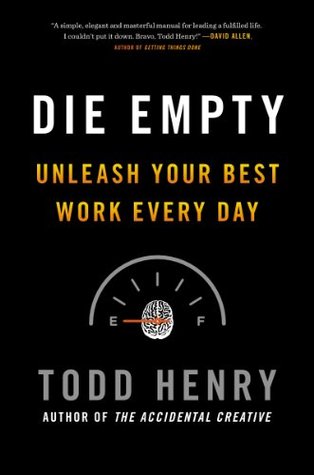More on this book
Community
Kindle Notes & Highlights
when we accomplish a goal or taste the sweet fruit of success, it’s tempting to keep pushing the same levers over and over again. However, this approach is often a fast track to mediocrity.
The key to long-term success is a willingness to disrupt your own comfort for the sake of continued growth.
Only those who will risk going too far can possibly find out how far one can go.
you need to maintain a level of disciplined curiosity, which means staying in touch with your deeper questions, and practicing the mechanics of divergent problem solving.
The key to overcoming the ill effects of a love of comfort is a commitment to continual growth and skill development.
The key to countermanding fear is to instill a practice of strategic, intentional, and purposeful risk-taking in your life and work. In other words, to experiment, play, and find your voice through taking small chances to express yourself through your work.
The secret, she said, is “finding the balance between going out to get what you want and being open to the thing that actually winds up coming your way.”
we should instead ask “What work am I willing to suffer for today?”
Small victories will increase your level of confidence and mastery, but consistent failure due to setting the bar too high will lead to frustration and continued aimlessness.
You can’t just wait around for inspiration to strike—you have to aggressively pursue it by asking probing questions and mining your environment for the raw materials of brilliance.
The best ideas often come from overlooked or abandoned corners of your experience.
I’ve learned that I need to lean into the fear of falling short, and push through the initial urge to retreat from the challenge of having to up my game. When I do this, my best work shines through.
if you act with conviction and are persistent, the world will eventually get behind your efforts, though it may take time and will most definitely require total commitment.
Don’t allow assumptions, destructive narratives imposed by others, or unrealistic expectations to define your engagement today. Instead, decide in advance how you will approach the task at hand. Act, observe, then redirect.
It’s much easier to make a rule than to attempt to cultivate wisdom.
At the heart of this desire to establish firm rules is a need for a greater sense of control.
Because of this, I see many people struggling to avoid making anything that seems on the surface to be too simple or obvious. In the effort to prove how accomplished they are, they overcomplicate their work. The assumption is that complexity proves value and removes the opportunity of being criticized for being too “simplistic.”
A confident person acts, observes, and redirects.
Entitlement can become like a noose, suffocating gratitude for even the most amazing gifts.
You will never do your best work until you learn to hone and trust your instincts, then develop the courage to take small steps in the right direction.
When you defer important conversations, you drive a wedge into your relationships and only increase the likelihood of challenges down the road.
Don’t worry about being great in the eyes of others; focus on excelling at your work.
The desire to be seen as great can be a paralyzing force. It’s something you can’t control. Measure your work by your daily progress on what matters to you, and leave the obsession with arbitrary scorecards to others.


